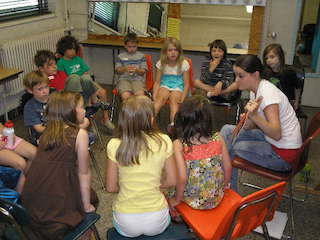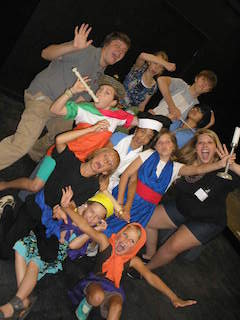Cre8tive Drama Day Camp
Postponed Until Further Notice
What is Cre8tive Drama Day Camp?
The Department of Theatre and Dance in affiliation with Cre8tive Drama presents "Cre8tive Drama Day Camp," a week-long summer day camp packed with fun drama and theatre activities. Appalachian State University faculty member Gordon Hensley and his trained teacher assistants lead these lively day classes for young people ages 6 - 16. "Drama and theatre is one of the primary ways children learn about life - about actions and consequences, about customs and beliefs, about others and themselves," Hensley said. "This camp is unique because it focuses on the process instead of trying to produce a play in a week. We do not 'put on a show' per se. Additionally, we are completely staffed by trained pre-service teachers of theatre."
The camp is held on the campus of Appalachian. Fees and dates are available on the registration form. All students must bring their own packed lunch and a refillable bottle of water. Light snacks are provided. The workshops are offered in age-appropriate blocks when possible. Block One: for ages 6 - 8, block Two: for ages 9 - 12, and block Three: for ages 13 – 16. Early drop-off and late pick-up is not available.
The Mission of Cre8tive Drama
 The mission of Cre8tive Drama is to transform young people through drama and theatre arts. Our curriculum utilizes eight drama structures alongside the North Carolina Standard Course of Study to promote 21st Century skills that will last a lifetime. We use process style drama activities lead by trained teachers of theatre to strengthen eight areas: developing and strengthening language and communication, problem solving, positive self-concept, social awareness, empathy, values and attitudes, and developing an understanding of the art of theatre.
The mission of Cre8tive Drama is to transform young people through drama and theatre arts. Our curriculum utilizes eight drama structures alongside the North Carolina Standard Course of Study to promote 21st Century skills that will last a lifetime. We use process style drama activities lead by trained teachers of theatre to strengthen eight areas: developing and strengthening language and communication, problem solving, positive self-concept, social awareness, empathy, values and attitudes, and developing an understanding of the art of theatre.
The 8 Drama Structures
- Pantomime - Acting and communicating ideas and characters without using your voice
- Drama Games - Building group cooperation and quick-thinking skills through creative games
- Storytelling - Sharing personal and traditional stories using body, voices, and imagination
- Story Drama - Exploring favorite stories from books, poems, and traditional fun fairy tales
- Social Drama - Using games, scenarios, and analogy to build social awareness and life skills
- Improvisation - Games and structures based on interplay and making it up as you go along
- Process Drama - Problem-solving a scenario as a group
- Puppetry - Creating and using puppets to perform original and scripted work for the class
The North Carolina Theatre Standards
- Use movement, voice, and writing to communicate ideas and feelings.
- Use performance to communicate ideas and feelings.
- Analyze literary texts and performances.
- Understand how to design technical theatre components, such as costumes, sets, props, makeup, lighting, and sound.
- Analyze theatre in terms of the social, historical, and cultural contexts in which it was created.
- Understand the traditions, roles, and conventions of theatre as an art form.
8 Goals of the Program
- Language and Communication - Language practice, and awareness of communication
- Problem-solving skills - A safe environment to explore solving conflict
- Creativity - An outlet for fostering and developing creative thinking and interactions through dramatic play and art
- Positive Self-concept - A perspective change to see where you fit in and how your life can, has, or may change
- Social Awareness - Exploring the "how" and "why" of different cultures, practices, and backgrounds
- Empathy - A chance to deepen understanding of why people feel the way they often do. A sense of "feeling with"
- Values and Attitudes - Consciously, or subconsciously, examining how your beliefs mesh or clash with others
- An understanding of the Art of Theatre - Experience the art of theatre through simple in-class performance/sharing
21st Century Skills Enhanced by the Program
- Adapting to change
- Being Flexible
 Managing goals and time
Managing goals and time- Working independently
- Being self-directed
- Interacting effectively with others
- Working effectively in teams
- Managing projects
- Producing results
- Guiding and leading others
- Being responsible to self and others
- Thinking creatively
- Working creatively with others
- Implementing innovations
- Reasoning effectively
- Systems thinking (parts of a whole)
- Making judgments and decisions
- Solving problems
- Communicating clearly
- Collaborating with others
- Assessing information
- Evaluating information
- Using and managing information
- Analyzing media
- Creating media products
- Applying technology
According to research and the North Carolina Department of Public Instruction:
"Drama teaches the basic life skills, thinking skills and personal qualities which:
- Promote higher-level critical and creative thinking skills, problem recognition and problem-solving, intuition, examination and implementation of conflict resolution;
- Assist in focusing the emotions for controlled use, strengthening the imagination for creative self-expression, disciplining the voice and body for purposeful use, expanding intellectual horizons to include aesthetic awareness, developing self-discipline, and providing a basic understanding and critical appreciation of all the theatre arts; and
- Enable students to function and communicate more proficiently, work independently as a member of a team, to value the individual contributions of others, and to learn virtually any subject matter in a more dynamic way."